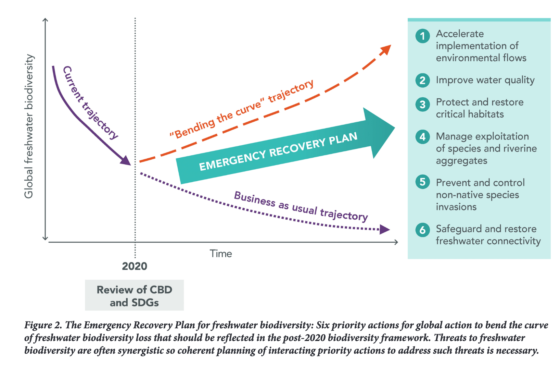Rivers, lakes and wetlands are among the most biodiverse places on earth. They cover less than 1 per cent of the planet’s total surface, yet they’re home to almost a quarter of all vertebrate species – including over half of all the world’s fish species. It’s an extraordinary fact: of 35,768 known species of fish, 18,075 – or 51 per cent – live in freshwater. And more are being discovered all the time, according to a new report published by 16 global conservation groups. But – nearly a third of the known freshwater fish populations are at risk of extinction, according to the report “The World’s Forgotten Fishes”.
This biodiversity is critical to maintaining not only the health of the planet, but the economic prosperity of communities worldwide.
About 200 million people across Asia, Africa and South America rely on freshwater fishes for their main source of protein, researchers said in the report. About one-third of those people also rely on them for their jobs and livelihoods.
Eighty freshwater species have already been declared extinct — 16 of them in 2020 alone.
“Nowhere is the world’s nature crisis more acute than in our rivers, lakes and wetlands, and the clearest indicator of the damage we are doing is the rapid decline in freshwater fish populations. They are the aquatic version of the canary in the coal mine, and we must heed the warning,” said Stuart Orr of the World Wildlife Fund, WWF.
“Despite their importance to local communities and indigenous people across the globe, freshwater fish are invariably forgotten and not factored into development decisions about hydropower dams or water use or building on floodplains. Freshwater fish matter to the health of people and the freshwater ecosystems that all people and all life on land depend on. It’s time we remembered that”, Orr continued.
Migratory species have dropped by more than three-quarters in the last 50 years. The European Eel used to make up the largest biomass of all freshwater fish species in Europe, but is now listed as critically endangered by the IUCN.

Source: Bending the Curve of Global Freshwater Biodiversity Loss: An Emergency Recovery Plan
The organisations behind the report call on governments to take action and implement an Emergency Recovery Plan for freshwater biodiversity based on six pillars: to allow rivers to flow naturally, improve water quality, protect and restore critical habitats, end overfishing and unsustainable sand mining, curb invasive species and remove obsolete dams. By committing to this plan, they say, countries can enhance the health of their rivers, lakes and wetlands –and secure the future of their fish and fisheries.
The recovery plan is echoed in the 5th edition of the Global Biodiversity Outlook (GBO-5), produced by the Convention on Biological Diversity (CBD) on behalf of its Parties. The 15th CoP under the CBD had to be post-poned last year, but it will take place in the second quarter of this year in Kunming, China. The monumental meeting will adopt a post-2020 global biodiversity framework, working towards the 2050 Vision of “Living in harmony with nature”.